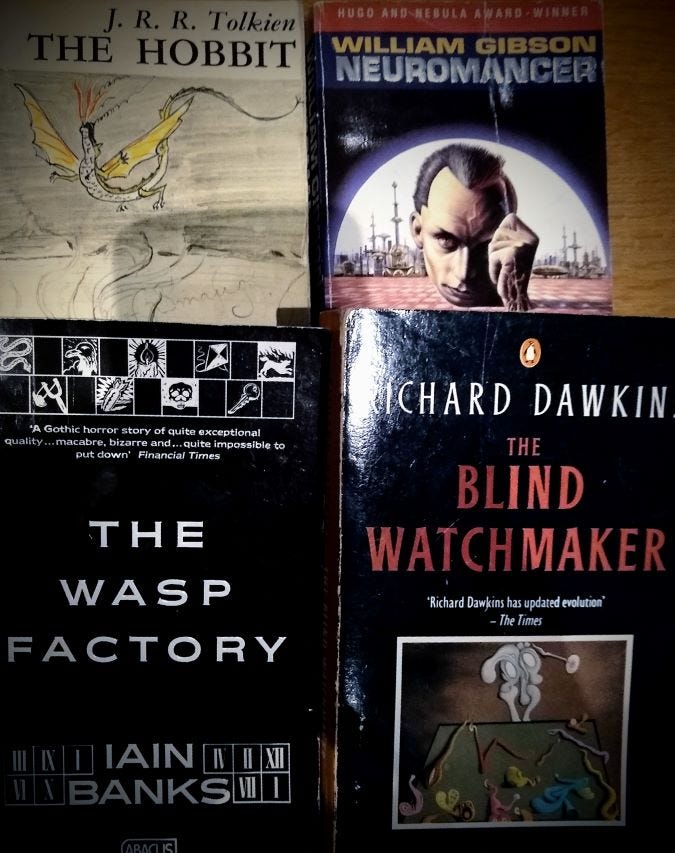Five Books That Changed My World
Having readers laugh, cry, ruminate on or celebrate your writing is an often overlooked privilege.
As 2023 beckons, I've been in a reflective mood. Below are some musings on a selection of five books through which authors influenced my youthful thinking about the world around me and its possible future.
Only now do I realise having readers variously laugh, cry, ruminate on or celebrate your writing is a rare and often overlooked privilege.
I wish you good health and fortune in the coming year and beyond.
As I approached my ninth year my child-mind had already started to expand into more exciting realms, beyond the mundaneness of school lessons and playing in a Waterside cul-de-sac, or even disassembling Hornby trains whilst assembling Lego bricks and metal Meccano. The elderly couple across the road were close friends with my parents, so much so I even referred to them as "aunty and uncle". They gave me a book as a birthday present. It was J.R.R. Tolkien’s ‘The Hobbit’.
Looking back now from the perspective of an author’s craft, I realise this story was my first proper ‘hero’s journey’, so quite unlike Kipling’s poem ‘If’ that had been pinned to my bedroom wall. Alternatively entitled "There and Back Again", The Hobbit left an indelible impression of where creative writing could take you, Tolkien’s words telepathically transposing across time the imaginings of an Oxford professor to a Hampshire boy. "What has it got in its pocketses?" still prompts a shudder as I recall riddles in a dank, dripping underground cavern. What child cannot be emotionally elevated by a battle between a dragon with a jewel-encrusted belly, hairy-toed lovers of a simple life and dwarves, as curiously named as Trumpton’s firemen, who forge magical weapons in Moria’s fire-lit caverns?
Moving from a far-fetched fantasy to a possible future for humanity was an easy step. I continued to ask "why?" at every opportunity to my exasperated parents. Asimov was my friend here. His ‘I, Robot’ collection of short stories was a thrilling imaginative feast. Huddled under my bedcovers, with a dying torchlight until my eyes closed of their own accord, his simple but holistic Laws of Robotics glowed onto my retinas. His astonishing moral prescience reverberates even today, as discussions rage on how to ensure artificial intelligences remain bent to our whims and desires. I went on to devour his Foundation stories, with their psychosocial tenets also now becoming a modern reality, with us giving up our thoughts and desires to gulping data vaults managed by tech mavens with teenage tendencies.
Whilst at school I’d stolidly resisted the call to Christian confirmation despite mandatory attendance at church four times a week. A natural scientific curiosity and habit of enquiry was soon bolstered by Richard Dawkins’s ‘The Blind Watchmaker’, an evolutionary treatise which logically and eloquently demolishes the proponents of intelligent design that many creation stories rest on. This and similar books provided a foundation of sceptical belief for rational, evidence-backed theories to be built on, which I did throughout my twenties. My efforts to understand how the world works continues to this day, with regular attendance at events like ‘Skeptics in the Pub’.
Fresh out of A-Levels as a supposed adult and now armed with a new-fangled home computer, which I learnt to programmatically bend to my will with mere bits and bytes, William Gibson’s ‘Neuromancer’ hit the bookshelves. With its uniquely tangible description of a digital matrix for frustrated geek’s imaginations to roam inside, avid readers like myself learnt a newly-minted word: cyberspace. But the grey static of disappointment still interleaves the dreams it inspires, as Gibson’s originally envisaged data-abstracted virtual world continues to remain stubbornly out of reach of fans of the cyberpunk genre, despite the intervening three decades of technological efforts.
lain Banks’s ‘Wasp Factory’ was a disturbing novel that hit you in the belly. Dark didn’t begin to describe its gothic themes. I still have a disturbing flashback whenever I see small children flying over-sized kites on a beach. Does what he described really happen when you deliberately tie taut strings around little wrists and wait for an offshore wind to strengthen? The ending is even more brutal - a reality shift that still easily outdoes the woke woes of more modern identity designators. Descriptive psychopathy at its finest, which pushed at my emotional boundaries for some time after reading it.
Which books have shaped your childhood and consequent thinking?

